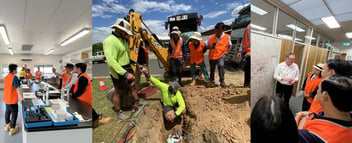Black swan or grey rhino: A perspective on the impact of COVID-19 on Australia’s supply chain
In late January 2020, the world as we know it was about to change forever when the first COVID-19 case was confirmed in Australia. In early March we started to see panic buying of products such as toilet paper and by 20 March, Australia’s borders closed to all non-residents. On 21 March, social distancing rules were imposed and state governments started to close all non-essential services such as pubs and clubs.
As part of our thirst to build resilience in the water industry and investigate what “the new normal” means for our members, the Australian Water Association Queensland Branch brought together three distinguished experts from a federal, water utility and grocery sector perspective to see what learnings we should take forward to build resilience for the water sector.
What do black swans and grey rhinos have in common with the supply chain risk? A black swan event is an improbable and unforeseeable occurrence. A grey rhino, on the other hand, is a highly probable, high impact threat that occurs after a series of warnings and visible evidence is often ignored. The COVID-19 pandemic has forced many companies and entire industries within and beyond the water sector to rethink and transform their global supply chain model.
A common thread from our leading experts was that fostering and leveraging relationships is key when responding to major disruptive risks. Cheryl Durrant, a fellow of the Institute for Integrated Economic Research — Australia and a Climate Councillor and former Director of Preparedness and Mobilisation for Australian Department of Defence shared the importance of avoiding group think and inviting more people into the conversation when facing a dragon king.
The dragon king theory was developed by Didier Sornette, who hypothesises that many crises are in fact dragon kings rather than black swans, as they may be predictable to some degree. According to Cheryl, vertical integration during times of geopolitical uncertainty becomes critical and we need to have the ability to leverage international relationships and use artificial intelligence and data analytics to manage our supply chains and have the ability to ask the correct questions. Cheryl also pointed out that complex international supply chains may unintentionally rely on a party who might not be counted as a friend should a global conflict arise.
We learnt from Roz White, co-owner of White’s Grocers and White’s Commercial Property Group on the Sunshine Coast, that local relationships were critical in maintaining supply to customers. Supply chains are managed through integrated planning and preparing well in advance for increased trade periods such as Christmas. Therefore, the unexpected increase in demand for products due to panic buying impacted the entire supply chain.
A simple solution on the coast to the toilet paper supply chain issue was to obtain surplus supply from the local hotel industry whose businesses were practically shutdown during this period. This is a good example of thinking outside the box and seeking supply from a client, rather than the usual supplier. Roz also mentioned that suppliers are now planning ahead to reduce their number of supply lines in times of emergency to enable them to keep up with demand.
Luke Sawtell, Manager Security and Resilience at Urban Utilities (UU) and Chair of the Water Service Group under Governments Trusted Information Sharing Network (TISN) said that UU invited their suppliers into the conversation early so they could manage supplier relationships, identify single points of failure in the supply chain and focus on local supply. Luke also lifted the curtain on the complex web of local, state and federal government bodies that are stood up in times of crisis, all with the best of intent but on occasion resulting in duplication.
A few common threads that emerged during the presentations from all three presenters included:
- Disruption is the new normal. Responding to the impacts requires innovation and courage.
- The situation is just background noise and organisations need to build resilience to deal with any situation to find opportunities.
- Look after your people as they will stick by you during times of crisis.
- Think about the lateral and vertical risks and interdependencies that impact your business and be very clear about the issue to be solved.
- Data is crucial to decision making and scenario modelling so consider who you are sharing data with, how accurate the data is and whether it enables you to ask the right questions.
- Organisations will need different capabilities and skills in the future to deal with major disruptive risks.
Whether it is supply-chain speed-dating, a national security strategy, an increase in local manufacturing or global governance, we realised that the profile of water resilience needs to be raised nationally and a Water Gaming Debate may just be the way to do it.

